- Home
- P. G. Wodehouse
Money in the Bank
Money in the Bank Read online
MONEY IN THE BANK
BY
P. G. WODEHOUSE
HERBERT JENKINS LIMITED
TABLE OF CONTENTS
CHAPTER I 3
CHAPTER II 7
CHAPTER III 12
CHAPTER IV 18
CHAPTER V 22
CHAPTER VI 25
CHAPTER VII 35
CHAPTER VIII 39
CHAPTER IX 46
CHAPTER X 49
CHAPTER XI 53
CHAPTER XII 58
CHAPTER XIII 68
CHAPTER XIV 77
CHAPTER XV 83
CHAPTER XVI 87
CHAPTER XVIII 98
CHAPTER XIX 102
CHAPTER XX 109
CHAPTER XXI 113
CHAPTER XXII 121
CHAPTER XXIII 129
CHAPTER XXIV 135
CHAPTER XXV 143
CHAPTER XXVI 148
CHAPTER XXVII 153
CHAPTER XXVIII 158
CHAPTER I
R. Shoesmith, the well-known solicitor, head of the firm of Shoesmith, Shoesmith, Shoesmith, and so on, of Lincoln's Inn Fields, leaned back in his chair and said that he hoped he had made everything clear.
He accompanied the remark with one of those short, quick, roopy coughs by means of which solicitors announce that a conference is concluded, and Jeff Miller came out of his meditations with a start. Mr. Shoesmith always reminded him of a bird, and in the attempt to decide just what kind of a bird he had allowed his attention to wander.
However, what he had missed must presumably have had to do with some aspect of the forthcoming case of Pennefather v. Tarvin, in which he had been briefed to appear for the plaintiff. That was what he had come here to discuss, and that was what Mr. Shoesmith had been talking about at the moment when he had ceased to hang upon his lips. So it seemed safe to nod intelligently.
"I think I have covered the various points?"
"Oh, rather."
"You agree with me that the case for the defence appears to rest upon the evidence of this witness, Lionel Green?"
"Absolutely."
"Your task, therefore, will be to endeavour to discredit his story. You must shake Green."
"Leave it to me."
"Unfortunately," said Mr. Shoesmith, "I am obliged to."
He sighed. You would have said that he was not in sympathy with Jeff, and you would have been right. Jeff had his little circle of admirers, but Mr. Shoesmith was not a member of it. About the nastiest jolt of the well-known solicitor's experience had been the one he had received on the occasion, some weeks previously, when his only daughter had brought this young man home and laid him on the mat, announcing in her authoritative way that they were engaged to be married.
He had said "Oh, my God!" or something civil of that sort, but it was only with difficulty that he had been able to speak at all. He could see in Jeff little or nothing of a nature calculated to cause a father, receiving such news, to wave his hat in the air and dance about on the tips of his toes. He disliked his hair, which looked like straw; his character, which he considered unbalanced; and his manner, which struck him as flippant and slangy. He could think of no detail in which his future son-in-law's deportment during the interview which was just terminating had not differed from that of the ideal young barrister, receiving instructions for his first appearance in the courts, and he felt a sort of detached pity for this Pennefather, whose fortunes were to rest in such hands.
But Myrtle had insisted that her betrothed be given his chance of winning forensic fame—or as much forensic fame as can be won by appearing for a taxi-driver who is suing an interior decorator for hitting him in the stomach—and he had long ago become aware of the futility of trying to oppose Myrtle's wishes.
So now he merely sighed, and rose to his feet, to indicate that he had had as much of Jeff as he could endure.
"Well," he said, with a wintry contortion of his facial muscles which might have passed in a dim light for a smile, “we must hope for the best."
"That's the spirit," agreed Jeff cordially. "Quiet confidence, and no weakening. You remember what Hengist said to Horsa before the battle of whatever it was?”
Mr. Shoesmith's face betrayed surprise at this erudition.
"Why, er, no, I do not. What did he say?"
“’Horsa, keep your tail up!' Good afternoon," said Jeff. "Good afternoon."
He left the office and made his way westward, walking with a long, swinging stride. For, whatever might be his spiritual shortcomings, Jeff Miller was a finely-built, athletic young man, one who did not have to call weakly for cabs to take him from Lincoln's Inn Fields to Halsey Court, Mayfair, where he had his modest residence, but was able to move thither under his own steam. A representative both of his University and of his country on the football field, with an impressive record at Twickenham, Cardiff Arms Park and other centres, he could have managed an even longer walk without distress.
As he threaded his way through the streets, he found himself once more brooding on Mr. Shoesmith—not this time on his appearance, for his research work at the office had left him pretty straight in his mind that what the other looked like was a cassowary, but on his character and disposition. A cold, aloof, non-bonhomous old blister, he decided, one whose soul his own must always fail to touch. He tried in vain to think of a single subject on which it would be possible for Pop Shoesmith, on the one hand, and himself, on the other, to see eye to eye.
And yet there was such a subject, and that of the first importance. Jeff's engagement to his daughter Myrtle was, as we have seen, one of which Mr. Shoesmith heartily disapproved, and it was one of which Jeff disapproved pretty heartily himself. Indeed, it is not too much to say that the thought of putting on a morning coat and sponge-bag trousers and accompanying Myrtle Shoesmith up the aisle chilled him to the marrow and made him feel as if he had been swallowing butterflies.
He was still quite at a loss to understand how the ghastly thing had happened. The facts seemed to suggest that he must have let fall some passing remark which had given the girl the impression that he was proposing to her, but he had no recollection of having done anything so cloth-headed. All he knew was that at a certain point of time at an evening party he had been a happy, buoyant young fellow, making light conversation to Myrtle Shoesmith behind a potted palm, and at another point of time, only a moment later, or so it seemed to him, he was listening appalled to Myrtle Shoesmith discussing cake and bridesmaids. The whole thing absolutely sudden and unexpected, like an earthquake or a waterspout or any other Act of God.
But, blurred though his mind might be with respect to many essentials of the affair, on one point it was crystal clear—to wit, that the emotion which her personality inspired in him was not love.
Love, he felt, and he was a man who had thought about these things, should not manifest itself in such a strongly-marked inclination, when in the presence of the adored object, to stand on one leg and twiddle the fingers. In the days of his boyhood, he remembered, at his preparatory school, the retired sergeant-major, who came twice a week to teach the elements of drill and physical culture, had afflicted him with just the same nervous diffidence which he experienced in the society of Myrtle Shoesmith, and it would be straining the facts absurdly to say that he had loved that sergeant-major.
With a growing sense of being a good man snared in the toils of Fate, like somebody out of Shakespeare, he crossed Berkeley Square and arrived at Halsey Court.
The day was a smiling and gracious day, early June at his best. In a hundred thousand homes, barometers, tapped by a hundred thousand knuckles before breakfast, had declined to budge from Set Fair, and the blue sky showed how sound their judgment had been. Yet over this stuffy little backwater there
brooded a sort of bilious twilight, as if an eclipse were in progress. Kalsey Court never bothered much about sunshine. What it specialised in was the smell of cooking cabbage. And for the first time, Jeff found himself disliking this aroma and yearning for something more on the lines of roses and lavender.
This change of heart he attributed to the fact that he had been musing on his approaching nuptials, for hitherto he had been well content with Halsey Court. It might be dingy, but it was quiet, and quiet was of importance to him. For though he had passed his Bar examinations to please a wealthy godfather, and was about to plunge into active practice because Myrtle Shoesmith insisted on it, he was also, and primarily, a man of letters. He wrote stories about mysterious Chinamen and girls with hair the colour of ripe wheat and the corpses of baronets in panelled libraries, and he found the cloistral peace of Halsey Court assisted the composition of these.
He passed through the court's narrow entrance, and turned to the right. This brought him to Halsey Chambers, on the third floor front of which he lived. He climbed the stairs, and let himself into his flat, to be greeted by Ma Balsam, his stout and motherly housekeeper.
"Oh, there you are, sir," said Ma Balsam, with that air of welcoming a prodigal son which always endeared her to her employer. "Miss Shoesmith was wanting to speak to you on the telephone just after you went out."
Jeff started.
"She's not back in London?"
"No, sir. She was talking from the friends in the country where she's staying. I told her you had gone to see her papa, and she said she would ring up again later. I hope everything turned out satisfactory, sir?"
"Eh?"
"Your talk with the young lady's papa."
"Oh, yes. Quite satisfactory. Let me see, how deeply did I take you into my confidence about all that?"
"You told me you thought the gentleman was going to give you a job as a mouthpiece."
"Well, he has. Yes, it's all settled, Ma. I appear for Ernest Pennefather, a licensed taxi-cab driver, who has invoked the awful majesty of the Law to help him pound the stuffing out of Orlo Tarvin, an interior decorator, claiming that in the course of a dispute about his fare Tarvin gave him a blow or buffet—whereby the said Pennefather goes in fear of his life. Interesting, of course, as showing what highly-strung, nervous men taxi-drivers are, but a bit on the minor side, one would have thought, for a man of my gifts. Still, the disemboweling of Green may give me some scope."
"Sir?"
"It appears that a second interior decorator, of the name of Lionel Green, was present during the proceedings and maintains that the alleged blow or buffet was not a blow or buffet at all, but in reality more in the nature of a playful prod or tap. And the attitude of the defence, I gather, is 'Laugh that off, J. G. Miller.' Well, we shall see. I have been instructed to shake Green, and I propose to do it till he feels like a cocktail. I shall be very courteous, of course, very polished and suave, but by the time I've finished with him Green will know he's been in a fight. But what rot all this is, Ma. Pennefather v. Tarvin, forsooth! What have I to do with the petty squabblings of these fretful midges? I ought to be at my desk, immersed in literary composition. Was that the telephone?"
"Yes, sir. Miss Shoesmith, I expect."
"You take a morbid view, Ma, but you are probably right."
It was Miss Shoesmith. The voice which spoke was immediately recognizable as hers both from its beautifully clear diction and the note of authority which it conveyed. One of the things which prevented any real communion of soul between this girl and Jeff was the fact that she always addressed him like a governess talking to a problem child.
"Geoffrey?"
"Hullo?"
"I rang up before, but you were out."
"Yes. Ma Balsam told me."
"I wish you would not call Mrs. Balsam ‘Ma.' It's vulgar, and it must make her familiar. Is everything all right?"
"Fine this end. How are conditions where you are?"
"You know perfectly well what I mean. About Father. Has he given you the brief?"
"Yes, I've got it."
"Good. Well, you will have no excuse, if you don't win the case. Father says the defendant hasn't a leg to stand on."
"Awkward, if he wants to roller-skate."
"What?"
"Nothing."
"You said something about roller-skating."
"No, I didn't."
"Who has been roller-skating?"
"Let it go, let it go. Don't give the matter another thought. Yes, I shall win, all right. I anticipate a sensational triumph."
"Well, we must hope for the best."
"Exactly what your father said."
"I shall be very annoyed if you don't win. All you have to do is follow Father's instructions. Mind you are respectful to the judge. Don't mumble. Don't grin. Don't hesitate. Be sure what you are going to say, and say it clearly and crisply. And your hair. See that it is tidy. But I was forgetting. You will be wearing a wig. Well, that is all, I think. Good-bye."
"Good-bye," said Jeff.
He replaced the receiver, and went to the window and stood there, looking out, his hands in his pockets, a frown on his face. Nature had intended him to be a cheerful, even exuberant young man, of ready laugh and face-splitting grin, but there was in his demeanour now a deep dejection. In the gutter below, sparrows were chirping their madrigals, but he showed no disposition to take the bass.
He could see no ray of hope on the horizon. With the feeling, which was his constant companion nowadays, for the wedding was fixed for the fifth of July and it was already the tenth of June, that if anybody cared to describe him as some wild thing taken in a trap, which sees the trapper coming through the woods, it would be all right with him, he threw a moody banana skin at the loudest of the sparrows, and went back into the room.
CHAPTER II
Immediately opposite Halsey Chambers, face to face with it across the narrow court, stands Halsey Buildings. It is a ramshackle edifice given over to stuffy little offices, whose proprietors consider that the privilege of printing the magic word "Mayfair" on their notepaper compensates for the lack of ventilation. And at the time at which this story begins, the window of the third floor bore the legend in large black letters:
J. SHERINGHAM ADAIR
(Private Investigator)
On the morning of the day following the trying of the case of Pennefather v. Tarvin, there turned in at the entrance of Halsey Court and started to make her way towards Halsey Buildings a young woman of stylish appearance and a certain rather bold and challenging beauty. Her golden hair gleamed brassily, her lips were ruddier than the cherry and her eyes sparkling and vivacious.
But they were not the sort of eyes which go with a meek and contrite heart, and one doubts if someone like the late John Knox would have taken to her very much. For, though a pleasing spectacle, she bore about her to the discerning gaze that subtle aura which stamps a girl as one of those at whose approach the prudent host packs away his knick-knacks and locks up the spoons. Her name was Dolly Molloy, and she was the bride of one Soapy Molloy, a share-pusher of some distinction.
Halsey Court was still its dishevelled self, and Dolly, as fastidious a girl as ever swiped a bottle of scent when the shopkeeper was not looking, eyed it askance. It was with a frown of distaste on her attractive face that she mounted the echoing stone stairs of Halsey Buildings and with the handle of her parasol—a present, though that institution was not aware of it, from Jarrow's Stores (Novelty Dept.)—rapped on the grimy glass of the door marked "J. Sheringham Adair."
It is, of course, practically impossible for anyone really to have a name like J. Sheringham Adair, and it may be stated at once that the man who had established himself opposite Jeff Miller's flat missed it by a wide margin. He was a dubious character called Twist, known to his intimates as Chimp. And at the moment when the staccato sound of ivory impinging on glass broke in upon his peace, he was seated at his desk, consuming a frugal lunch.
The abrupt i
ntimation that an unexpected caller had arrived brought him to his feet in sudden agitation, choking on a sandwich. As one whose business methods had led him to incur a good deal of displeasure in a good many quarters in his time, he always quailed when his privacy was invaded without appointment. Too often, on such occasions, he had been compelled to jump out of windows or to hide in cupboards. Indeed, his first act now was to cast a quick glance at the spacious closet behind his desk, and he had already started to make a move in its direction, when the door opened and the discovery of the intruder's sex stilled his alarm. A moment later, he was himself again. He had recognised an old acquaintance.
"Well, well, well," he cried. Mrs. Molloy was not a woman of whom he was fond, but relief lent an almost effusively welcoming note to his voice. "Well, well, well, look who's here. Come along in and sit down, Dolly, Take the clean chair."
"What clean chair?" asked the visitor, establishing herself, after an inspection which might have pained a more sensitive man, on a corner of the desk. "Are you trying to grow mustard and cress in here, or sump'n? Well, Chimp, it's a long time since we run across each other. You look about the same as ever."
This, if true, was rather a pity, for Mr. Twist's appearance could scarcely but have been improved by alteration. Pie was a small man with the face of an untrustworthy monkey, the sort of monkey other monkeys would have shrunk from allowing to come within arm's reach of their nut ration, and, not content with Nature's handiwork, had superimposed on his upper lip a waxed moustache of singular hideousness. Nevertheless, he appeared to regard the remark as a tribute.
"Sure, I keep pretty good," he said, curling the growth with a toothpick. "How's Soapy?"
A cloud seemed to pass over Dolly's face. A keen ear might have detected a tremor in her voice, as she replied that Soapy was all right.
"And what brings you around?"
" Well, I happened to be in these parts, and I thought I'd look in. I'd sort of like your advice about something. And then there's that five smackers Soapy loaned you getting on for over a year ago and not a yip out of you since. I'll collect that while I'm here."

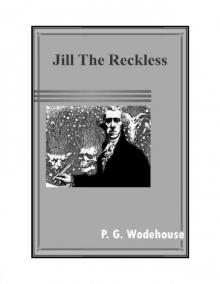 Jill the Reckless
Jill the Reckless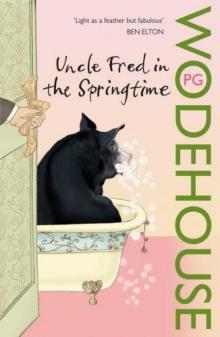 Uncle Fred in the Springtime
Uncle Fred in the Springtime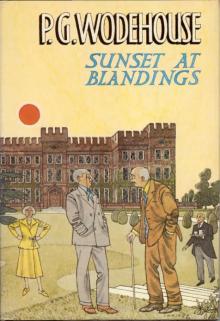 Sunset at Blandings
Sunset at Blandings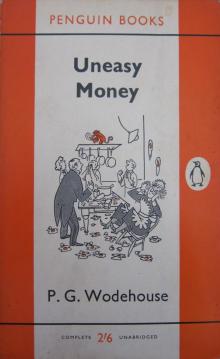 Uneasy Money
Uneasy Money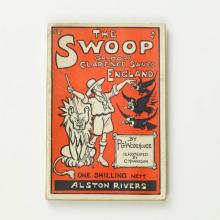 The Swoop! or, How Clarence Saved England: A Tale of the Great Invasion
The Swoop! or, How Clarence Saved England: A Tale of the Great Invasion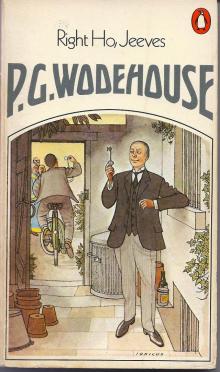 Right Ho, Jeeves
Right Ho, Jeeves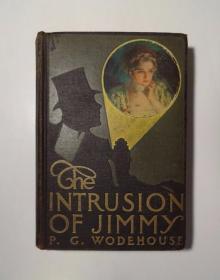 The Intrusion of Jimmy
The Intrusion of Jimmy The Jeeves Omnibus - Vol 1:
The Jeeves Omnibus - Vol 1: Aunts Aren't Gentlemen:
Aunts Aren't Gentlemen: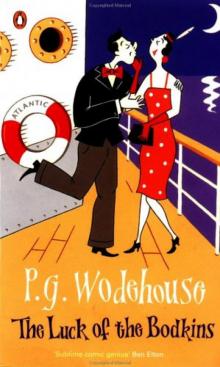 The Luck of the Bodkins
The Luck of the Bodkins The Little Nugget
The Little Nugget Money for Nothing
Money for Nothing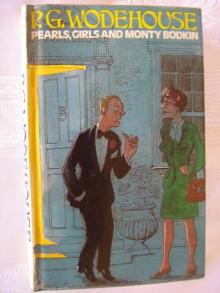 Pearls, Girls and Monty Bodkin
Pearls, Girls and Monty Bodkin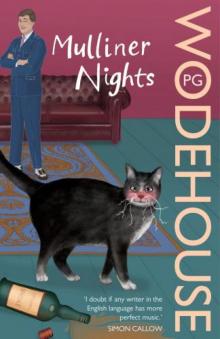 Mulliner Nights
Mulliner Nights Blandings Castle and Elsewhere
Blandings Castle and Elsewhere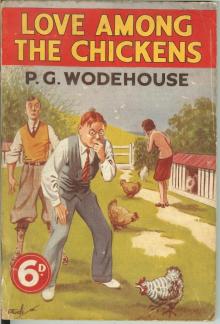 Love Among the Chickens
Love Among the Chickens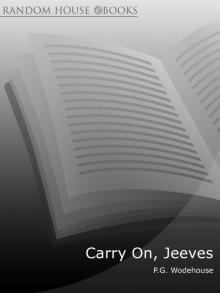 Carry On, Jeeves!
Carry On, Jeeves!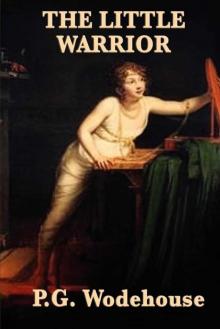 The Little Warrior
The Little Warrior Ice in the Bedroom
Ice in the Bedroom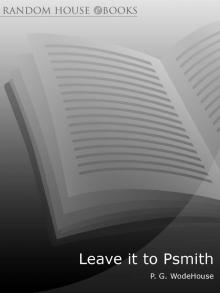 Leave It to Psmith
Leave It to Psmith Thank You, Jeeves:
Thank You, Jeeves: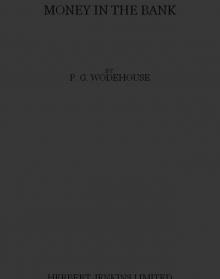 Money in the Bank
Money in the Bank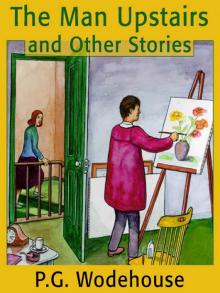 The Man Upstairs and Other Stories
The Man Upstairs and Other Stories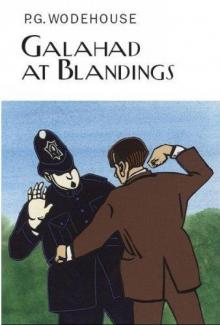 Galahad at Blandings
Galahad at Blandings The Jeeves Omnibus Vol. 5
The Jeeves Omnibus Vol. 5 Uncle Dynamite
Uncle Dynamite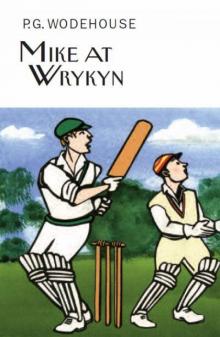 Mike at Wrykyn
Mike at Wrykyn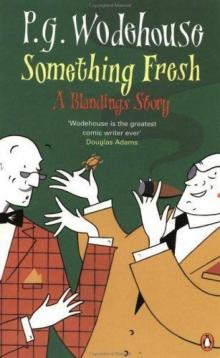 Something Fresh
Something Fresh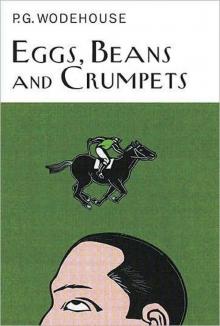 Eggs, Beans and Crumpets
Eggs, Beans and Crumpets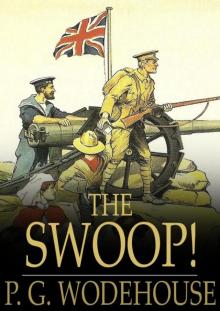 The Swoop: How Clarence Saved England (Forgotten Books)
The Swoop: How Clarence Saved England (Forgotten Books)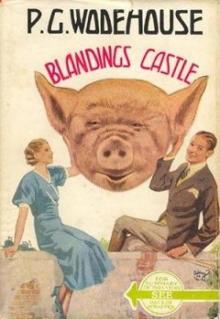 Blanding Castle Omnibus
Blanding Castle Omnibus Wodehouse at the Wicket: A Cricketing Anthology
Wodehouse at the Wicket: A Cricketing Anthology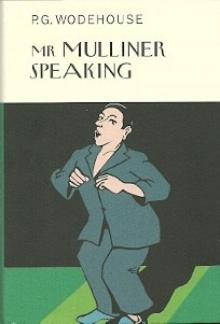 Mr. Mulliner Speaking
Mr. Mulliner Speaking Hot Water
Hot Water The Jeeves Omnibus - Vol 3: The Mating Season / Ring for Jeeves / Very Good, Jeeves
The Jeeves Omnibus - Vol 3: The Mating Season / Ring for Jeeves / Very Good, Jeeves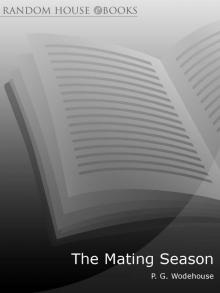 The Mating Season
The Mating Season Meet Mr. Mulliner
Meet Mr. Mulliner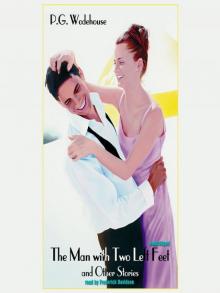 The Man with Two Left Feet, and Other Stories
The Man with Two Left Feet, and Other Stories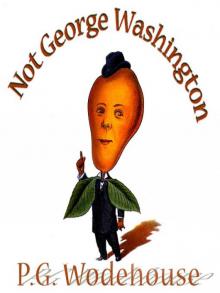 Not George Washington — an Autobiographical Novel
Not George Washington — an Autobiographical Novel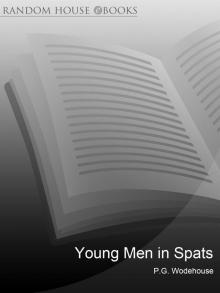 Young Men in Spats
Young Men in Spats The Jeeves Omnibus Vol. 4
The Jeeves Omnibus Vol. 4 A Pelican at Blandings:
A Pelican at Blandings: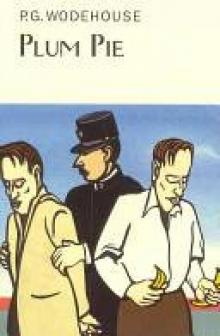 Plum Pie
Plum Pie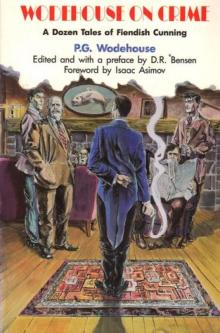 Wodehouse On Crime
Wodehouse On Crime The Jeeves Omnibus Vol. 2: Right Ho, Jeeves / Joy in the Morning / Carry On, Jeeves
The Jeeves Omnibus Vol. 2: Right Ho, Jeeves / Joy in the Morning / Carry On, Jeeves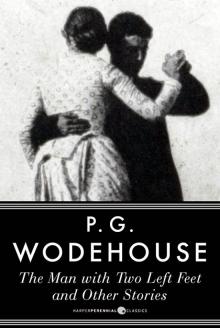 The Man With Two Left Feet
The Man With Two Left Feet Full Moon:
Full Moon: Jeeves and the Feudal Spirit:
Jeeves and the Feudal Spirit: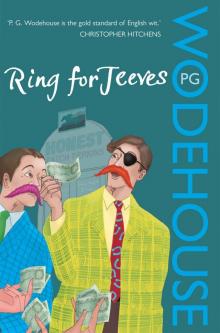 Ring For Jeeves
Ring For Jeeves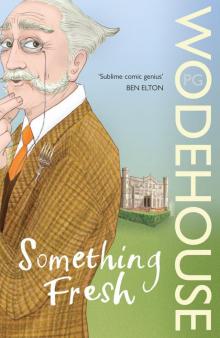 Something New
Something New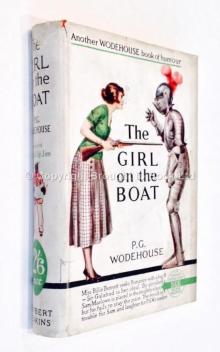 The Girl on the Boat
The Girl on the Boat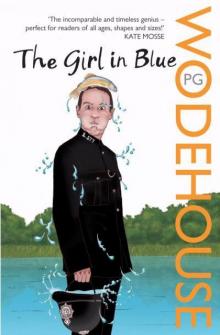 The Girl in Blue
The Girl in Blue Pigs Have Wings:
Pigs Have Wings: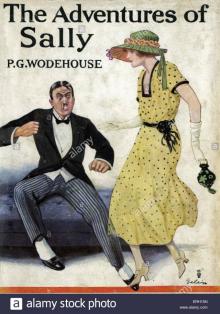 The Adventures of Sally
The Adventures of Sally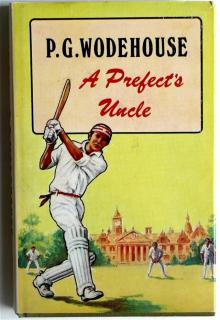 A Prefect's Uncle
A Prefect's Uncle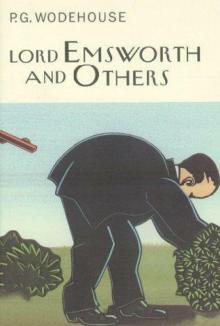 Lord Emsworth and Others
Lord Emsworth and Others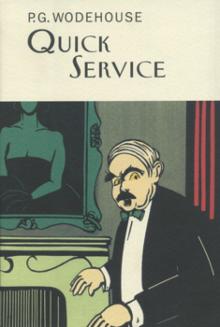 Quick Service
Quick Service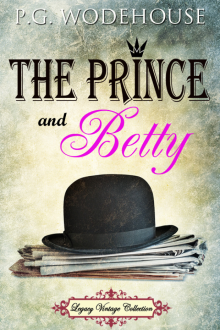 The Prince and Betty
The Prince and Betty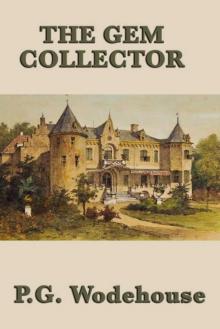 The Gem Collector
The Gem Collector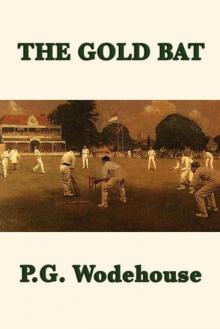 The Gold Bat
The Gold Bat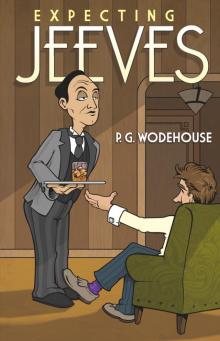 Expecting Jeeves
Expecting Jeeves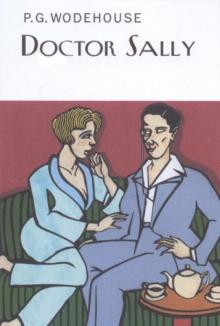 Doctor Sally
Doctor Sally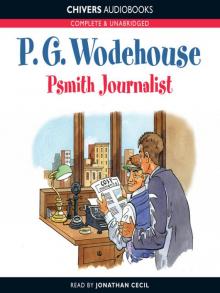 Psmith, Journalist
Psmith, Journalist The Golf Omnibus
The Golf Omnibus Heavy Weather
Heavy Weather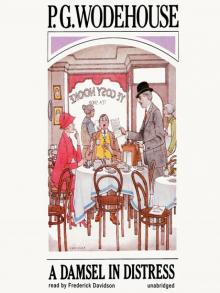 A Damsel in Distress
A Damsel in Distress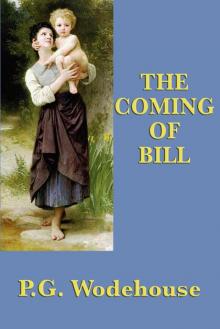 The Coming of Bill
The Coming of Bill Summer Lightning
Summer Lightning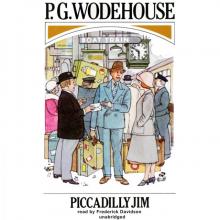 Piccadilly Jim
Piccadilly Jim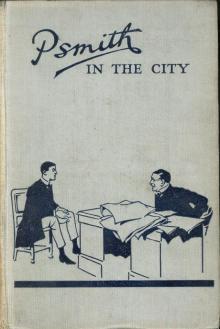 Psmith in the City
Psmith in the City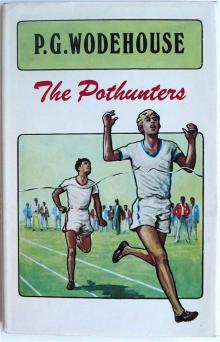 The Pothunters
The Pothunters Service With a Smile
Service With a Smile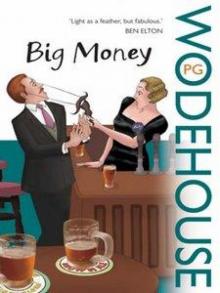 Big Money
Big Money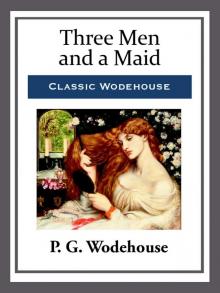 Three Men and a Maid
Three Men and a Maid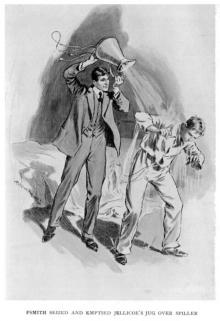 Mike and Psmith
Mike and Psmith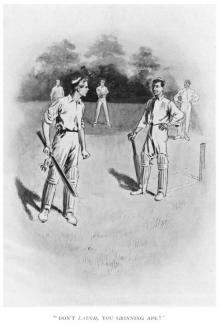 Mike
Mike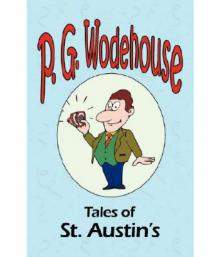 Tales of St. Austin's
Tales of St. Austin's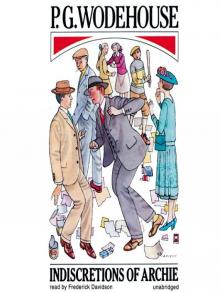 Indiscretions of Archie
Indiscretions of Archie Pigs Have Wings
Pigs Have Wings The Jeeves Omnibus - Vol 4: (Jeeves & Wooster): No.4
The Jeeves Omnibus - Vol 4: (Jeeves & Wooster): No.4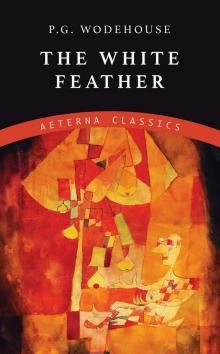 The White Feather
The White Feather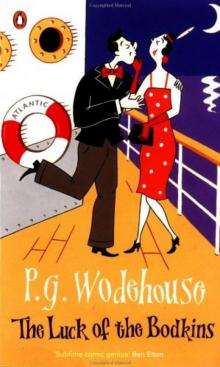 Luck of the Bodkins
Luck of the Bodkins THE SPRING SUIT
THE SPRING SUIT Full Moon
Full Moon Very Good, Jeeves
Very Good, Jeeves Thank You, Jeeves
Thank You, Jeeves Reginald's Record Knock.
Reginald's Record Knock. Wodehouse At the Wicket
Wodehouse At the Wicket LADIES AND GENTLEMEN V. PLAYERS
LADIES AND GENTLEMEN V. PLAYERS The Jeeves Omnibus - Vol 5: (Jeeves & Wooster)
The Jeeves Omnibus - Vol 5: (Jeeves & Wooster) The Jeeves Omnibus - Vol 1: (Jeeves & Wooster): No.1
The Jeeves Omnibus - Vol 1: (Jeeves & Wooster): No.1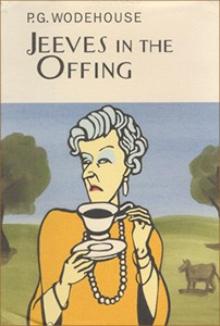 Jeeves in the offing jaw-12
Jeeves in the offing jaw-12